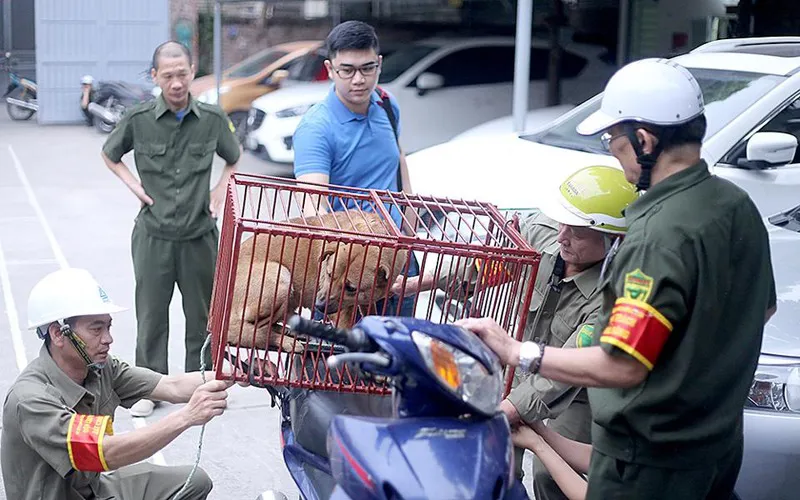Hanoi should be pioneer saying no to dog and cat meat: Officials
The slaughter and trade of dogs and cats for human consumption create a negative image of the city in the eyes of international tourists and expats.
Hanoi should be a pioneer in saying no to dog and cat meat, said officials at a workshop held in the capital city on July 4.
Speaking at the workshop on "Trade and Consumption of Meat from Domestic Animals (Dogs, Cats): Policies, Challenges and Opportunities", Deputy Director of Hanoi's Department of Agriculture and Rural Development Ta Van Tuong said that Hanoi is not only an important political, economic, cultural and scientific center of Vietnam, but also a "city for peace" that attracts millions of tourists. Therefore, the slaughter, trade, and consumption of dog and cat meat have inconvenienced tourists, especially international visitors and foreigners living in the capital.
An overview of the workshop. Photo: Hien Minh/VGP |
Rahul Sehgal, Director of International Advocacy, Soi Dog Foundation said the ban on the sale and consumption of dog and cat meat would be an effective tool, and Hanoi could be a pioneer in this pilot.
He said Soi Dog Foundation is committed to supporting the development of legal frameworks, behavior change, and social perception of non-consumption of dog and cat meat.
Ta Van Tuong also urged relevant sectors and people to prevent rabies, set up rabies-free zones, and control the killing, trade, and use of dog and cat meat.
"Hanoi authorities should collect stray and homeless dogs to prevent rabies, promote animal welfare and humanitarian activities, strictly control violations in the trade, transport, and killing dogs and cats, and gradually improve people's awareness," he suggested.
At the event, participants said the consumption of dog and cat meat is an old social habit that requires behavior change. In the long term, it's necessary to have communication campaigns targeting traders and consumers.
According to the World Health Organization (WHO), the trade, transport, slaughter, and consumption of dog meat is a potential threat to public health. It increases the risk of infectious diseases like spirochetes, cholera, and typhus.
Statistics from international animal welfare organizations show that the Vietnamese market consumes an average of five million dogs and one million cats per year, second only to China, which consumes about 20 million.
Speaking at the workshop, Nguyen Tuan Anh from the Standing Committee of the National Assembly said the trade and consumption of domestic animal meat (dogs and cats) is a growing concern. "It has attracted the attention of the government and the community at all levels. The management of domestic animals and regulations on animal welfare are also issues on discussions."
He noted that Vietnam already has a legal framework in this regard, but it shows weak law enforcement. It is necessary to mobilize stronger participation of ministries and organizations to minimize threats to public health and ways to prevent infectious diseases.
Since 2018, the Hanoi People’s Committee has issued a statement saying the killing and selling of dogs and cats for human consumption tarnishes the image of the city in the eyes of international tourists and expats.
A Hanoi functional unit catches a homeless dog for rabies prevention in Khuong Dinh Ward, Thanh Xuan District, Hanoi. Photo: Le Khanh |
This eating preference tarnishes Hanoi's image as "civilized and modern," the statement said, adding that "the city wants people to see the value of treating animals humanely and wants residents to give up the habit of eating dog and cat meat."
After one year, Hanoi's Veterinary Department reported that the number of people eating dog meat had decreased, but to be truly effective, the campaign will have to last for decades, as people's habits are long-term and difficult to change.
The city's Department of Agriculture and Rural Development also came up with the idea of "banning the sale of dog meat in Hanoi's urban districts" in 2021.
The department's statistics showed that Hanoi's total number of dogs and cats is currently between 421,000 and 460,000 and growing. Up to 88% are kept for "household purposes", while the rest are bred to be sold or eaten.












